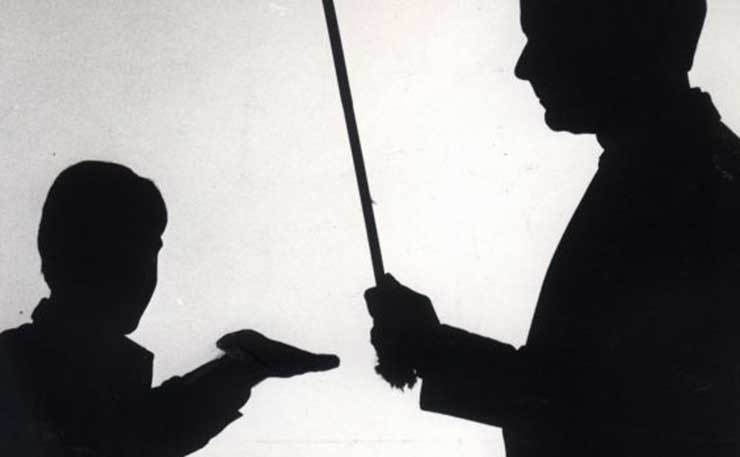
In schools, the traditional method of disciplining children still involves the use of physical force

"My teacher used to beat me for not being able to remember multiplication tables. For each mistake, he would strike me thrice here," says 12-year-old Mudassar showing his palms. "Writing with my hand would hurt for days. When I told my mother, she said that I should stop being naughty in class and pay attention."
Mudassar, a resident of Kamahan village in the outskirts of Lahore, dropped out of school when he was in grade 1. He now works as a helper with a gardener. He talks about his cousin who recently matriculated and works as a chauffeur for an affluent household, and is earning enough money. He is confident he can still do the same without having to go through the ordeal of structured learning in ‘a prison’.
According to a 2010 report by the Society for the Protection of the Rights of the Child (SPARC), up to 35,000 students drop out of high school every year because of corporal punishment in Pakistan. Especially in public schools, the regressive practice of caning and paddling students is common which may even result in broken bones and severe physical injuries. Parents often allow teachers to use physical violence for the ‘good of their children’ leaving much to the conscience of the teachers.
The roots run deep: School is seen as the extension of the home -- where the traditional method of disciplining children involves the use of physical force.
"Children, especially boys, are so rowdy that they make it really difficult for teachers. Such students make up for a large chunk of the class, and disrupt decorum by throwing ink at each other, cross-talk and other distracting behaviours," says Farooq, a senior teacher at Central Model School in Lahore who teaches English to grade 8 students.
Read also: The disability to learn
He believes that most students have become very disrespectful towards teachers and are uninterested in education, and sometimes, teachers are left with no other recourse to discipline students. He also comments on the decreasing number of physical and extracurricular activities due to security concerns which has made the school experience boring for children.
"Teachers don’t focus on building good relationships with their students. Most people who venture into the field are not really committed to investing into their students. They just teach and leave," says Musarrat Ikram, who holds an M.Sc degree in Psychology, and runs a charity school for girls on Walton Road in Lahore.
"Imagine having a bunch of young energetic people in a room figuratively tied down for about six hours to study," she says, continuing that she tries to train teachers at her school to make sessions more interactive and enjoyable for students. She also thinks breaking the monotony by organising funfairs and outdoor activities for her students has a positive effect on their level of motivation.
She disagrees with Farooq’s opinion about the ‘traditional’ method to help discipline students, and says she takes strict action in case such an incident takes place at her school. "Physical punishments and even snubbing and shaming children verbally can have disastrous effects on their learning and confidence. It stunts their intellectual growth."
Her views are also backed up by Dr Tahir Pervaiz, a consultant psychiatrist at Punjab Institute of Mental Health. "Positive rewards are the most effective in terms of modifying behaviour. Punishment, in fact, leads to a lot of problems in the long-run," he says, adding that children might develop issues with authority figures, and have problems such as social anxiety and depression.
"If this happens at school, children are likely to become withdrawn. They will often find themselves unable to focus on their studies. This leads to negative associations of fear and punishment when it comes to education," he explains.
Physical punishment in particular is counterproductive to establishing desired behaviour patterns. Younger children especially, he elaborates, "have a difficult time trying to understand why they are being punished".
Alan Kazdin, President American Psychological Association in 2008 and a psychology professor at Yale University, believes, "you cannot punish out these behaviors that you do not want. There is no need for corporal punishment based on research. We are not giving up an effective technique. We are saying this is a horrible thing that does not work."
For a country where 25 million children are out of school, and where students especially in public schools drop out fearing the violent process of getting education, it is high time that this realisation sinks in. The law in Pakistan bans schools from administering corporal punishment but it does allow ‘light’ punishment which is just as problematic.
Reasons used to justify why teachers still administer corporal punishment are mostly centred on the financial issues that teachers are facing and the lack of training on areas such as sensitivity. Neither the curriculum nor the method of teaching has evolved to capture children’s imagination. The state’s sluggishness in this regard is both deplorable and inexcusable. Childish playfulness and exuberance needs to be nurtured and given direction instead of being punished. Classrooms should engage children’s curiosity and give them the means to explore the world around them instead of instilling fear and dread.